 Mom and Dad have that beautiful 4-bedroom house at the end of the cul-de-sac now , but they didn’t have it when they were just starting out. Expecting to walk out those college doors and into a cushy situation like your parents currently enjoy just isn’t realistic. And if you have any doubts, sit them down and ask. Encouraging Mom and Dad to talk about the early years is akin to opening the flood gates to the past. Chances are good they’ll be more than happy to tell you how they walked to school uphill both ways until the ripe old age of 30.
Mom and Dad have that beautiful 4-bedroom house at the end of the cul-de-sac now , but they didn’t have it when they were just starting out. Expecting to walk out those college doors and into a cushy situation like your parents currently enjoy just isn’t realistic. And if you have any doubts, sit them down and ask. Encouraging Mom and Dad to talk about the early years is akin to opening the flood gates to the past. Chances are good they’ll be more than happy to tell you how they walked to school uphill both ways until the ripe old age of 30.
It’s better to start your adult life with modest expectations — a nice apartment that isn’t too far from work, a car that runs most of the time — living modestly at the onset will enable you to start saving early. And that’s the key to financial stability down the road.
Spend Small
When you’re just starting out in the world, you don’t need all new furniture, the latest model car and a wardrobe to rival Kate Middleton’s. Buy your furniture at estate sales and auctions, find used cars on Kelley Blue Book and shop the discount retailers for those power suits that work requires.
Spending small helps you tuck money away, and when that unfortunate circumstance does occur you’ll have the funds to plug on through until times get better.
Save Big
According to The Wall Street Journal, 20 percent of your take-home pay needs to go directly into savings. This is the ideal formula for creating a nest egg to see you through tough times. Use the 50/30/20 formula — 50 percent to needs, 30 percent to wants and the rest neatly tucked away and earning interest. As your experience grows and your pay increases, so do your weekly savings deposits. By following this general rule of finance, you’re set to come out ahead at the end of the day.
Use Your Credit Wisely
In a perfect world, no one would need credit cards. Unfortunately, the world is far from ideal and the fact is you do need credit to build credit. According to MyFico.com, you should have credit cards, but they should not be maxed out. They shouldn’t be sitting idle with no balance due either. The best formula for credit cards and your credit score is to keep one or two cards on hand. Keep a small monthly balance on each and pay them on time.
But having too much open credit available can adversely affect your score as well. The most important take-away to remember with credit cards is that too much credit is just as detrimental as too little. As in all things, aim for moderation.
Pay Your Debts on Time All the Time
If you think that chronically late payment to the power company will never come back to haunt you, you’re mistaken. Pay your bills — all your bills — on time. On credit accounts, pay more than the minimum due when possible. Most debtors, from the bank who holds your car loan to the landlord who owns the building, report back to the three major credit unions. Keep your reputation and your spending in check and it will pave the way to good fortune and good credit down the line.
Did you enjoy this post? Find more money saving tips here.
